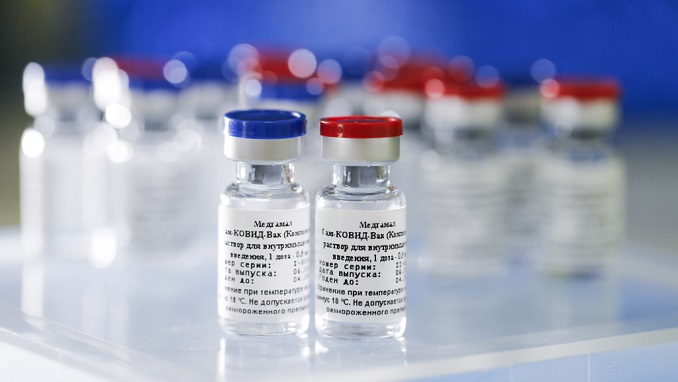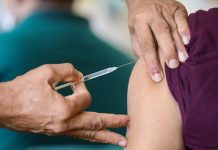Russia’s Sputnik V vaccine has 91.6% efficacy against symptomatic coronavirus, interim trial results have suggested, The Guardian reports.
The preliminary findings are based on analysis of data from more than 20,000, mostly white, participants, three-quarters of whom received the vaccine. The remainder received a placebo.
No serious adverse events were deemed to be associated with vaccination, and most reported adverse events were mild, including flu-like symptoms, pain at the injection site and weakness or low energy.
The vaccine, which is backed by the Russian Direct Investment Fund (RDIF), is administered in two injections 21 days apart. In the 21 days after the first dose, there were 16 cases of Covid-19 in the 14,964 people (0.1%) in the vaccine group, and 62 cases of the disease in the 4,902 individuals (1.3%) in the placebo group.
The trial included 2,144 participants aged 60 and older; in this subset the vaccine had 91.8% efficacy against symptomatic disease, researchers wrote in the journal The Lancet.
Similar to the Oxford/AstraZeneca vaccine, Sputnik V is based on a modified version of adenovirus, a common cold virus. This is tailored to carry genetic instructions for making the coronavirus spike protein, which it passes to human cells. The manufactured coronavirus spike protein then triggers an immune response to protect again Covid-19.
However, in contrast to the former, Sputnik V uses two different human adenoviruses to try to trigger a stronger and longer-term immune response. Employing a different vector for the second dose is designed to diminish the risk of the immune system developing resistance to the initial vector.
This analysis includes only symptomatic cases of Covid-19, the researchers cautioned, noting that further research is required to understand the effects of the vaccine on asymptomatic Covid-19 and on transmission. In addition, patients were followed for up to 48 days after their first dose, so the durability of protection also remains to be seen.
Four deaths were reported during the trial. One person died in the placebo group due to a stroke, while the remaining three deaths occurred in the vaccine group – but were not attributed to the vaccine. One patient had a fracture, while the other two had underlying conditions and developed symptoms of Covid-19 four to five after the first dose of the vaccine, which indicated they had been infected before the trial, the researchers suggested.
Serious side-effects were observed in 68 patients, of which 45 were in the placebo group. None of these were attributed to the vaccine.
“This recent positive phase 3 trial … is highly encouraging in terms of efficacy, a lack of serious side effects and seemingly equivalent protection in older patients,” said Dr Stephen Griffin, associate professor in the school of medicine at the University of Leeds.
This study was not designed to assess the efficacy of just the first dose, but when the researchers looked at the level of protection from day 15 to 21, efficacy against moderate or severe Covid-19 was 73.6%, they said. The team is planning to launch trials to test a one-dose regimen, dubbed Sputnik V light, in the coming weeks, said Kirill Dmitriev, the chief executive of RDIF.
Last month, plans to test a combination of the Oxford/AstraZeneca and Sputnik V vaccines were also announced.
The Sputnik V late-stage trial is ongoing, and aims to recruit at least 40,000 people. When Russia granted the vaccine the regulatory go-ahead and launched mass vaccinations before data from phase 3 trials was unveiled, scientists expressed concerns and lamented the lack of transparency.
“Russia was right all along,” said Dmitriev on Tuesday.












